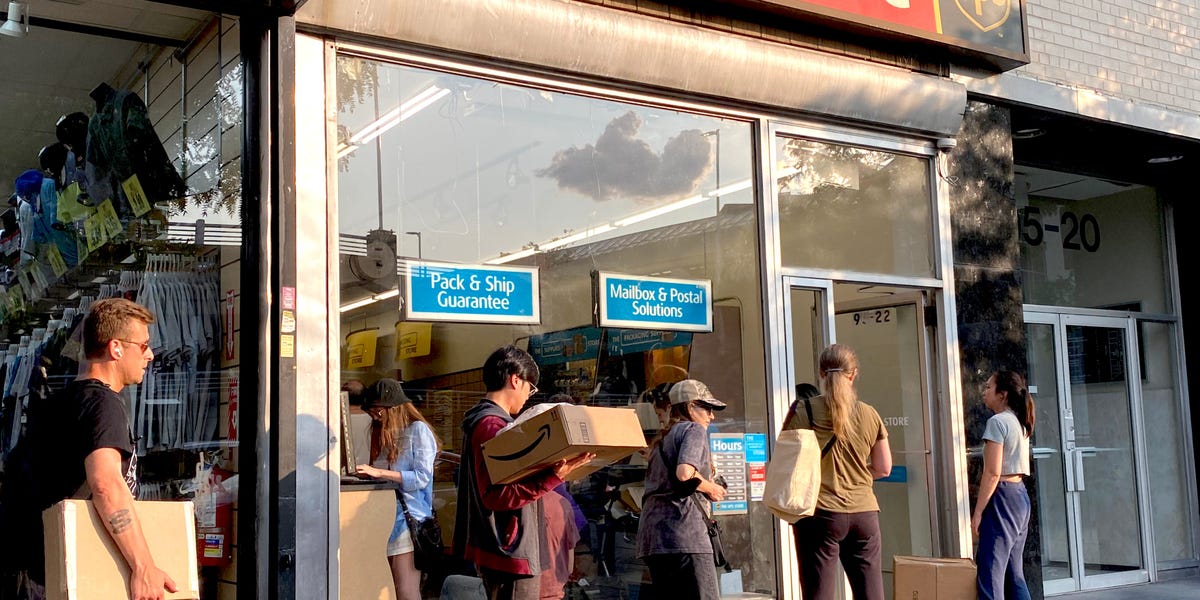
The UPS Chaos Shows Tariffs Have Finally Arrived on Our Doorsteps
Rich DeThomas never thought ordering wine from Italy would be this complicated.
In late August, he ordered a dozen bottles of red wine to be sent to his home in Huntsville, Alabama. It never showed up. Citing recent tariff changes, UPS requested more details about the shipment before saying it couldn’t deliver the wine to DeThomas at all.
After receiving a replacement shipment from the vineyard, he also got a $13 bill from UPS for “abandoning” the first case.
“It’s the headache of dealing with it all,” DeThomas said. “What the hell? What’s going on?”
DeThomas is one of the Americans finally experiencing the ramifications of President Donald Trump‘s April announcement of sweeping tariffs on most countries. Many customers’ latest headaches are coming after the Trump Administration ended the de minimis loophole in August, which exempted shipments worth under $800 — and many consumers’ most common purchases — from tariffs.
Now, customers are realizing that, in addition to paying the cost of tariffs, some are having to become amateur customs brokers to make sure their online order arrives.
The chaos has become especially apparent for UPS customers like DeThomas. The service has left customers’ US-bound packages sitting at its warehouses for days or weeks, and, in some cases, said that it would dispose of their shipments because of customs issues since the demise of a loophole for small shipments under $800, Business Insider has reported.
Tariff tedium frustrates consumers
After Trump’s so-called Liberation Day, business leaders and economists predicted a spike in inflation and shipping chaos. Walmart and Amazon were among the companies that said they’d be raising prices. Importers increased ordering to build up inventory before tariffs took effect.
Then, we waited. Over the summer, inflation ticked up slightly, and stories of surprise bills for online orders began trickling out.
Now, consumers say they’re having to learn about wonky aspects of tariffs — what’s the product’s country of origin? How do I verify that I’m being charged the right fee?
In early September, after DeThomas’ 12 bottles of red wine were held up for several days at UPS’s Louisville facility, a customs broker for UPS told him via email that they would either be abandoned or returned to the sender at their cost. “Personal wine imports ORDERED ONLINE are NOT permitted,” the broker wrote.
UPS did not respond to questions from Business Insider about DeThomas’ experience, including which policy its broker was referencing when they said that online orders of wine aren’t allowed.
“If this is going to happen, I’m not ordering it,” DeThomas said.
Katie Golden, who resells clothes on Depop, said that she expected to pay some tariffs when she ordered $179 worth of used apparel from the UK. Still, she said, she was surprised when UPS sent her a bill for $769 when her shipment reached the US, including a $54 brokerage fee.
Golden said that she’s trying to dispute the tariff and have her bill reduced. She said that she suspects that UPS didn’t understand what was in her shipment and applied the wrong tariff rate.
“It shouldn’t be this hard to order a package,” she said.
Some UPS customers have told Business Insider that they are trying to contest their tariff bills after their shipments were hit with the 200% tariff rate for Russian aluminum — among the highest rates that the US charges on imports — though their shipments didn’t contain metal from the country.
Tom Strohl, president of consulting firm Oliver Wight Americas, said that customers could look for alternatives to buying stuff abroad if they keep running into problems with tariffs. Companies that ship into the US should either factor tariffs into their purchase prices or allow customers to pay the tariffs when they place their order, he said.
“If customers are confused, it’s going to affect their brand,” he said. “That, to me, is the worst possible outcome for a supplier.”
That’s a concern for businesses that, like many in the US, are gearing up for another busy holiday shipping season. Kunal Sharma, who owns two Ontario, Canada-based businesses that sell parts for luxury cars, said that he’s already watched UPS lose or return some of his US-bound shipments since the end of the de minimis loophole.
“I can’t even imagine how bad it’ll get on Black Friday,” he said.
Economists expect tariffs to affect US consumers in other ways, such as raising prices and making it harder to get a job. Fed Chair Jerome Powell has said that tariffs have prevented the central bank from cutting interest rates sooner.
But the duties’ effects on shipping and ordering stuff abroad may continue to be one of the clearest examples of the duties hitting home for Americans.
George Hayes is considering cutting back on ordering from outside the US.
The North Carolina resident imports figurines, pillows, and other goods popular in the Otaku community from Japan. The products are often cheaper there than equivalents for sale in the US. With the new tariffs on small shipments and backups at services like UPS, though, Hayes said that he’s planning to hold off on ordering more until there’s clearer guidance on what he can and can’t import and which tariffs will apply.
Hayes paid about $700 in tariffs on his last shipment. But it’s not just the cost: For many items, he now has to report the country they were manufactured in to determine the correct tariff — a challenge, he says, since he buys many secondhand items.
Before the end of the de minimis loophole, he said, that was something he never had to think about.
“I wish we could have that again,” Hayes said of the system before this year’s tariffs. “We didn’t know how good we had it.”
Do you have a story to share about UPS or tariffs? Contact this reporter at [email protected] or 808-854-4501.
First Appeared on
Source link







